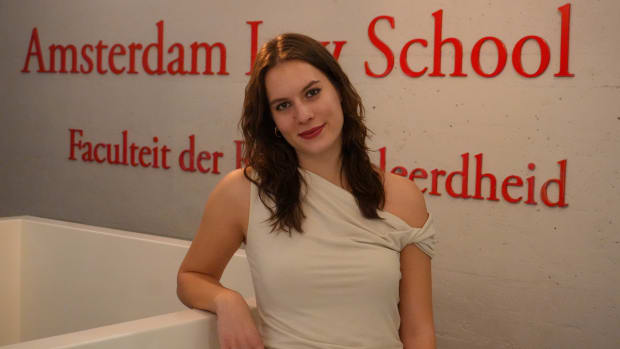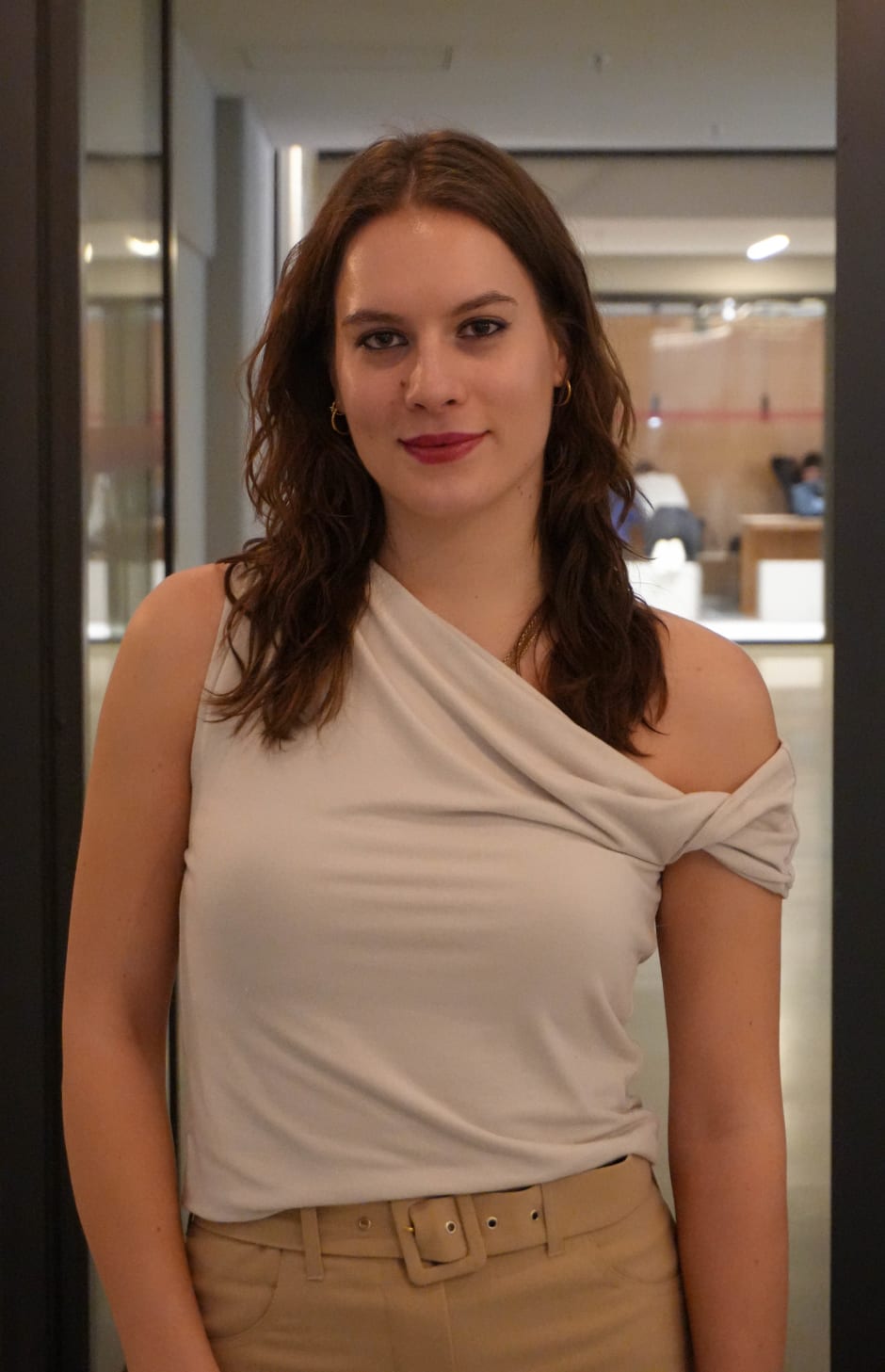
Hungarian Kinga Pőcze studies law in Dutch: ‘A rollercoaster of emotions’
UvA student Kinga Pőcze is from Hungary, but has been studying law in Dutch since this year. This is not without its difficulties. ‘I can't really take notes during classes; it goes much too fast for that.’
When Kinga Pőcze (23) came to Amsterdam from Hungary, she took two important life lessons with her. You have to work hard to get ahead in life and people can take everything from you except your head and your mind. Armed with those two maxims, she dove into the books. Three years later, Hungarian Pőcze not only has two English-language bachelours in hand - PPLE at the UvA and International Public Management at the Hungarian University of Public Services - but also a diploma in Dutch (B2 level).
Now it is time for the ultimate test, she thinks: studying law in her newly acquired language. This puts her in a select group. According to Nuffic, a Dutch organisation for internationalisation in education, in academic year 2023/24, there were only 2,229 international students taking a university course in Dutch; 4.1 per cent of the total number of international students in the Netherlands. What motivates such a person? And how does Pőcze experience it?
Before we start - the key question - shall we have the conversation in Dutch or English?
“I can understand the language, but speaking is more difficult,” says Pőcze with some embarrassment. “I do feel more comfortable now talking Dutch with people I know.” Laughs: “But with people I don't know, I get shy.”
Statistics Netherlands (CBS) figures show that over 30 per cent of international students stay in the Netherlands after their studies to work here. That percentage has increased in recent years. The government wants to attract fewer international students to the Netherlands, but wants them to stay more. To that end, the government wants the Dutch language to become the norm at universities again.
Then we will just do it in English. But it makes the question all the more urgent: what made you decide to study law in Dutch?
“When I came to the Netherlands to study PPLE three years ago, I noticed that you can’t really get a job in the legal sector if you can’t speak Dutch at a professional level. I looked for legal internships, for example, but everywhere it was a requirement. That did surprise me. After all, Amsterdam is so internationally oriented. Since I do want to become an accredited lawyer and would otherwise have to redo my entire studies in Hungary, I thought: I’m just going to do it, learn Dutch and then become a lawyer here. I was always ambitious and hardworking anyway. Moreover, at PPLE I ended up in an environment with other very ambitious people, which made me feel that nothing is impossible. I still feel that way. During the summer, I mentally prepared myself for it and luckily I get support from my friends and family.”
And, is it pleasant or disappointing?
“The courses are not necessarily difficult, many legal subjects we also had during classes at PPLE. But the language... that’s really challenging yes. At PPLE, the differences between me and my fellow students were not that big yet. Now it takes me three or four times longer to read something compared to my fellow students. I can’t really take notes during classes either; it’s much too fast for that.”
The other day you had your first exam, how did it go?
“That was a rollercoaster of emotions: from fear and nerves to a feeling of wow I’m just taking an exam in Dutch now! Before, it was a question of whether I was going to get a 7 or an 8, now it was more a question of whether I would be able to answer a question at all. I don't get any extra time either, but I am allowed to use a dictionary. So in the exam room, I was the only one sitting with such a book next to me, surrounded by my Dutch fellow students. That felt a bit odd haha. But it also offers advantages. When my Dutch fellow students told me afterwards that they didn't understand a word in a question, I could just look in the dictionary during the exam to see what it meant exactly.”
According to the UvA Languages website, someone who has mastered Dutch at B2 level can ‘understand the main idea of a complex text, on both concrete and abstract topics, including technical discussions in their own field.’ Reading that, you would say that you could pass an exam in Dutch, or is that too easy to say?
“Yes, that’s disappointing. I can understand abstract things, like jokes, but I certainly can’t yet speak Dutch at a level that would make it easy to study at university. For instance, when I started this study, I didn't even understand the names of the subjects. I mean: ‘Goods law’, what is that? Since then, my vocabulary, partly due to my studies, has been enriched considerably. The other day I said to my Dutch friend the word ‘fairness’, he had no idea what I meant haha.”

After Hungarian (mother tongue), French (also B2-level) and English (C1+-level, one step higher than B2), Dutch is now officially your fourth language. Will it stay there or do you want to learn more languages?
She laughs. “I’d like to be able to do Italian or Arabic as well. When my parents heard that, they thought: first make sure you stay at a good level with these languages... then we’ll see. But I also went to Taiwan this summer and now I think: Chinese is also interesting haha. I want to understand cultures. Language is such a great way to get to know someone both personally and the culture they grew up in.”
You got a 7.5 for your first exam, you told on LinkedIn. Are you proud?
“I’m grateful for the opportunity to take these exams. That I can sit there. That I kind of know what it’s about and that I can understand the questions by now. That’s why I was so happy with this mark and wanted to share it. A completely different feeling than during my previous studies. Whether I pass it now actually matters less to me. Because it’s already such a great achievement for me that I’m doing this at all.”

